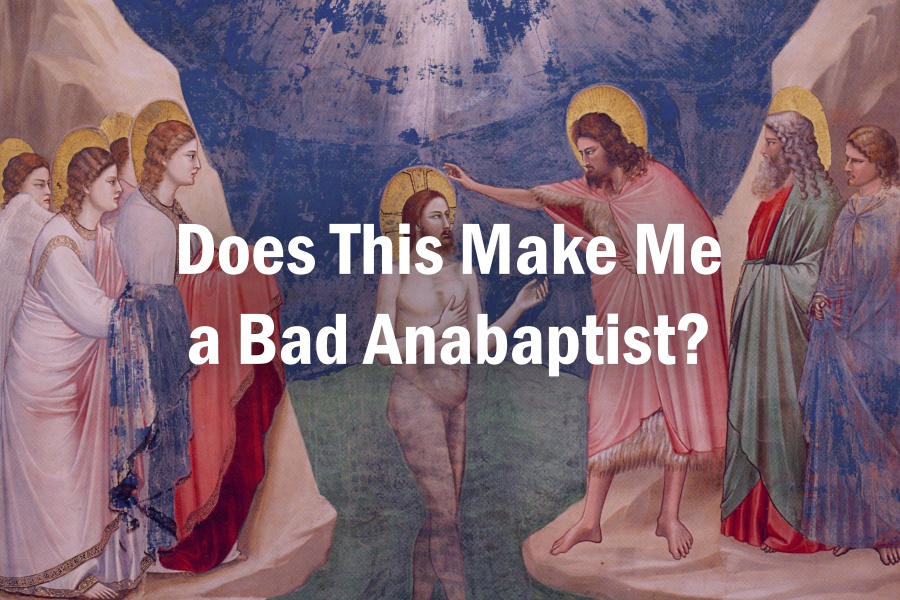I have a confession to make. I don’t care very much about baptism. Does this make me a bad Anabaptist?
But I guess I should clarify: I actually care a lot about baptism; I just don’t care about baptism.
It is of incredible importance to me that we share in Christ’s death and resurrection. It is imperative that we unite ourselves with other believers to help one another as we seek to follow Jesus together. And I believe it is essential to begin our journey with a public affirmation of our belief that Jesus is Lord.
All of these things are baptism, and I care immensely about them. But I don’t really care about baptism.
I don’t care if you get sprinkled, doused, or dunked. I don’t care if it’s done one time or three. I don’t really even care if you’re baptized as an infant or an adult.
That’s not to say I don’t have an opinion on these matters. I do, and my opinion aligns with Anabaptism. But these things don’t define Anabaptism for me, despite the name.
The technically inaccurate label of Anabaptist (or “re-baptizer”) was given as a pejorative to those sixteenth-century Reformers of a Radical bent, who reserved baptism for individuals who could make the decision for themselves.
This is the “what” of so-called Anabaptism (and I agree with it), but in my opinion, the “why” is so much more important.
There are at least four major reasons the earliest Anabaptists held this position:
-
The church of the day taught that children were automatically damned if they died without having been baptized. This belief stemmed from Augustine’s notion of original sin—the idea that we’re born already guilty of Adam’s sin. Naturally, this made infant baptism a pretty big deal. Who would want to risk their children’s eternal destiny? Anabaptists, however, disagreed with this belief. Some rejected original sin altogether, while others taught that Jesus’ sacrifice was sufficient to cover original sin, at least until children were capable of making a choice for themselves.
-
Anabaptists understood baptism as initiation into a life of discipleship. They viewed it as the public declaration of an individual’s repentance and commitment to follow Jesus. But since infants could not make such choices, Anabaptists were concerned that children whose faith was defaulted to them would grow into nominal Christian adults who would never truly follow Jesus.
-
Because the church and state were so closely fused in those days, baptism had political implications in addition to spiritual significance. The state essentially used infant baptism as a means to register its citizens. Baptism placed people on the records for such things as taxation and military service. But Anabaptists were deeply opposed to this union. They advocated the separation of church and state centuries before Thomas Jefferson.
-
Finally, Anabaptists believed that the teaching of the New Testament agreed with their position. They saw no precedent for infant baptism therein. Rather, they saw that the instruction to baptize was usually preceded by a call to repentance. So how could they baptize their children who had not yet repented?
With these historic reasons in mind, I’d like to offer a few reflections of my own:
-
I wholeheartedly reject the teaching of original sin. Though we may inherit the effects of sin and even a tendency toward sin, we absolutely are not born guilty of sin our ancestors committed. That said, few today who hold to original sin still teach that children are damned if they die without baptism. Rather, they generally baptize infants in order to welcome them into the covenant community of faith. Though it may have a more sacramental emphasis, this practice is not entirely dissimilar from child dedication, to which few Anabaptists or Baptists would object.
-
I agree with the Anabaptist emphasis on discipleship, and I also believe it’s important to make a public declaration of one’s intent to follow Jesus. However, we begin discipling our children long before they make that commitment for themselves. Additionally, it strikes me that while infant baptism is parallel to child dedication, confirmation is in many ways parallel to adult baptism. Regardless of which practice we view as the sacrament, most Christians today agree that children should be welcomed immediately into church and that they should also make a public profession of faith once they are old enough to choose it for themselves.
-
Nearly all churches today are separated from the state, at least to a much greater degree than they were in the days of the Protestant Reformation. Anabaptists still tend to emphasize a further separation than other branches of the church, but since infant baptism is no longer used to register citizens, this particular objection is no longer relevant.
-
While I agree with the Anabaptist understanding of baptism in the New Testament, I have to acknowledge that it is far from a clear-cut case. Those who teach infant baptism have decently sound exegetical arguments they can make as well. If we’re honest, we all tend to read our ideas about baptism into the New Testament, more than the other way around.
In conclusion, whatever else we might believe about baptism, it is certainly a sacrament. And whatever else we might believe about sacraments, they are certainly intended to create unity within the church, not division.
So while I care deeply about baptism, for all the reasons outlined above, I don’t care one bit about baptism if it is being used as a source of division among believers. We’re not nearly so far apart as we may at times believe.
















